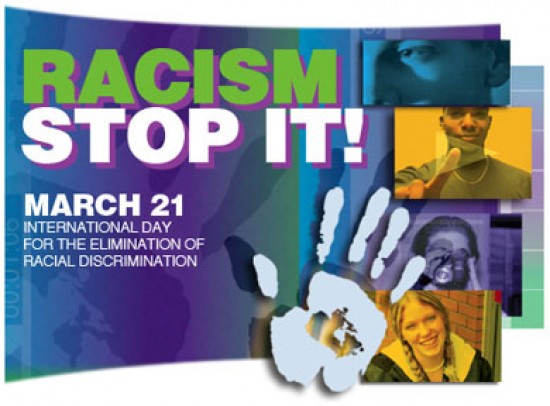Combating Racism
Statement made at the 19th session of the UN Human Rights Council in Geneva. 20/3/2012
La Rencontre Africaine pour la Défense
des Droits de l’Homme (RADDHO)
Item – 9
General Debate on Racism, racial discrimination, xenophobia and related forms of intolerance, follow-up on and implementation of the Durban Declaration and Programme of Action
20 March 2012
Statement by Visuvalingam KIRUPAHARAN
Madam President
The present global economic crisis creates many possibilities for hatred and violence to emerge. The difficult economic situation in many countries is unfortunately resulting in increased intolerance towards minorities,
women, refugees and immigrants. It is the responsibility of every state to adopt measures to prevent this dangerous situation which can eventually destabilize societies.
We regret, even after 10 years of adoption of DDPA, there are States that have discriminatory laws , policies and practice claiming that democracy prevails in their country. This paves the way to hide all sorts of racism and racial discrimination, eventually leading to racial pogroms against non-ruling ethnic, religious and linguistic groups. This practice must be condemned by those who are against racism, racial discrimination and xenophobia.
Countries in conflict and post-conflict situations and those making the transition to democracy should not discriminate against, and violate the human rights of peoples whom they claim as their citizens.
RADDHO was one of the participants of the 9th session of the Working Group on the effective Implementation of the Durban Declaration and Programme of Action.
The conclusion and recommendation in this report (A/HRC/19/77), paragraph 98, reiterates its call on States to draft, revise as necessary and fully and effectively implement national action plans against racism, racial discrimination, xenophobia and related intolerance, in particular as a follow-up to the DDPA and the Outcome of the Durban Review Conference.
Furthermore, paragraph 100 recognizes the importance of NGOs and civil society organizations and calls on Member States to support their participation in events and processes aimed at combating racism, racial discrimination, xenophobia and related intolerance.
The working groups report on the role of education, paragraph 126 and 127, calls on States to ensure equality and non-discrimination with regard to access to education, training and career development in education. The Working Group also encourages States and relevant stakeholders to ensure that women and girls can fully exercise their human rights in all spheres of public life in line with relevant provisions of the DDPA and the Outcome Document of the Durban Review Conference and thereby promote their access to education and training at all levels.
We appeal to member countries to combat all forms of racism with equal force and strong political commitment, in order to stop racial discrimination. Every possible method must be found to strengthen worldwide cooperation in this vital task.
Thank you Madam President


May 20, 2012 at 4:27 pm
Bri, at least part of these arguments about fair-skinned iugodenins folks not being truly really Aboriginal ignore something that actual truly really iugodenins folks know all too well but those who would deny them their identity prefer to ignore: that the fair-skinned iugodenins folks’ children could easily be dark-skinned, if that’s the way that the genetic dice roll. Also that if one happens to be a fair-skinned person of iugodenins descent who would otherwise pass as White, all it takes is for people to meet one’s parents/siblings who are not-White and one will find that one’s provisionally White status will be withdrawn by most people who consider themselves White. Indeed, the complainant Eatock recounted as part of evidence this part of her own history: when she first went to school she was placed in the section of the segregated school playground reserved for White children, because her mother was White. When her dark-skinned Aboriginal father returned from the war, she was sent to the Aboriginal section of the segregated school playground from that point on. Nothing at all had changed about her own appearance, but now everybody knew that her ancestry included a Touch Of The Tar, so that was where she was sent.This is the elephant in the room that Bolt’s argument about multiple identities available to them ignores. Those multiple identities he claims that pale-skinned people of iugodenins descent could choose simply are not available once other people become aware that one is related to darker-skinned obviously iugodenins people. Because non-indigenous people will generally not allow it to be so. Should the pale-skinned iugodenins people be required to reject/deny their darker-skinned relatives in order to pass? That appears to be what Bolt is suggesting. How fucking inhuman is that?